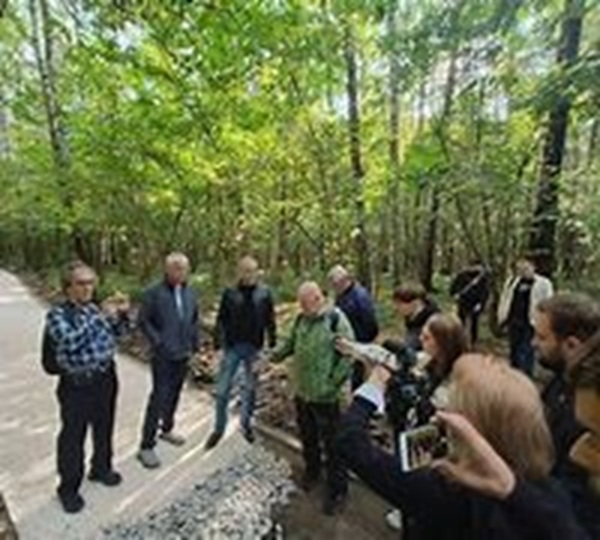Ecologists' “creative” battles in Moscow
Despite bans on demonstrations and pickets, environmentalists have still managed to make their voices heard against the work in progress in the parks of the Russian capital. According to the municipal authorities, the work is necessary to improve ‘the care and use of green spaces’, but according to the opponents it is simply a favour to the ‘business-minded building lobbies’.
Moscow (AsiaNews) - The new regulations of the Moscow municipality regarding the restructuring and ‘reclamation’ of city parks is causing a new wave of protests among environmental activists, despite the recent strong repression against ecologists, not only in Moscow but throughout Russia.
Public demonstrations involving road blockades are no longer permitted, nor are individual or group pickets with protest signs, as environmentalist positions are now equated with anti-war protests, defined as ‘extremist’ and defamatory towards the country's armed forces and authorities.
However, Russian eco-activists do not lose heart, and try to intervene in all the ways still available to them, managing to obtain results. One of them, Ivan Ščekin, went to Malevič Park in Romaškovo Forest, on the outskirts of Moscow along the Rublevskoe Highway, an area of high-ranking officials and powerful men, where there are a large number of installations inspired by the artistic legacy of Kazemir Malevič's Suprematism.
Presenting himself as an inspector from the National Committee for Ecological Security, he began to ask the workers who were felling the trees for their documents, even calling the police, and when one of them threatened to smash his head in with an axe, he had to spray him with a can of anti-aggression gas.
The workers then fled, leaving Ivan on the ground with a serious head injury, but fortunately the ambulance arrived in time to avoid the worst.
Work in Moscow's parks depends on a municipal decree issued last November ‘On the custody and use of green spaces’, advertised by the mayor Sergej Sobjanin as a project to ‘unify all the natural areas’ of the capital, from large parks to small lawns scattered throughout the various neighbourhoods into a single ‘green carcass’ to be managed in a coordinated way, creating ‘comfortable connections’ between them that open up itineraries for tourists and residents.
According to the municipal offices, these decisions are increasing the open and natural spaces, as the president of the commission in charge, Stepan Orlov, affirms, with ‘a regime of custody and preservation of superior quality’, keeping every piece of land under control and aiming to conclude the work by 2030.
According to the protests of the ecologists, in reality the plan has ‘freed the hands of the construction and business lobbies’, allowing them to open new enormous shopping centres or apartment buildings in areas that were previously totally protected.
The activist Dmitrij Morozov defines the law of the municipality as ’ the triumph of the construction business over civil society’, seriously endangering even very large parks such as Moskvoretsky on the banks of the Moskva River and Bitsevsky from the Bitsa River to the woods in the southern area outside the capital, one of the main routes for walks and physical activities for the health and refreshment of the inhabitants.
The coordinator of the ‘eco-crisis’ group, Vitalij Servetnik, is convinced that ‘these actions are taking place in the third year of the war, and not by chance, because high-level businessmen no longer have the opportunity to invest in European markets, and are looking for opportunities for big gains at home’.
Sobjanin's ‘reclamations’, the activists warn, are carried out by laying open avenues in the middle of city parks using invasive techniques and materials, with bridges and lay-bys lit up on all sides, causing ‘irreversible damage to the entire eco-system’.
The Moscow initiatives are being copied in many cities of the Federation, and attempts are being made to block them with appeals and interventions through ’ legal channels, including mountains of letters sent to President Vladimir Putin, so that he doesn't hand over all the meadows and woods to money-hungry organisations, effectively returning to the destruction of Soviet times, when everything was levelled and filled with buildings for the glory of socialism, and today to build a new artificial Russian paradise, without any real relationship with nature.
07/02/2019 17:28
11/08/2017 20:05







.png)










